|
|
Post by novastar6 on Apr 30, 2022 3:38:45 GMT
By now probably everybody knows the stereotype black guy dies first in a horror movie, I think Jaws 3D is what really drove that one home, but thinking about it, I can't think of a whole lot of horror movies where that's true.
Scream 2
The Killer Shrews, that I think could be (one of) the earliest examples
Investigation 13
and then on the other side of the spectrum:
Night of the Demons, black guy still standing at the end,
same with the remake of House on Haunted Hill
Ben in Night of the Living Dead, last to die
Trick, black detective among the last 3 survivors
So just off the top of my head, more times the black guy at least makes it to the end if not outright survives, than dies first.
Anybody else want to weigh the scales here?
|
|
|
|
Post by nicktatler76 on Apr 30, 2022 19:55:16 GMT
The Thing- Childs was one of the two survivors
Alien- Parker was the last one to die
|
|
|
|
Post by masterofallgoons on Apr 30, 2022 21:45:46 GMT
I think The Shining sticks out as the example most people might point to.
But I also think Scream 2 is where most of the idea of this as a trope stems from in popular culture, as opposed to being founded in real examples. And that's kinda tongue in cheek.
|
|
Deleted
Deleted Member
@Deleted
Posts: 0
Likes:
|
Post by Deleted on May 1, 2022 0:12:10 GMT
I think The Shining sticks out as the example most people might point to. But I also think Scream 2 is where most of the idea of this as a trope stems from in popular culture, as opposed to being founded in real examples. And that's kinda tongue in cheek. Roger Ebert actually references the trope in his review of The Edge, predating Scream 2 by four months, so the trope was around before that. Though he credits it to action films. On that note, I think this started as "the black dude always dies", evolved into "the black dude always dies first", and ended up linked to mainly horror movies. There's a whole scene in Canadian Bacon where they talk about black guys always dying in movies, but they talk about all kinds of genres, not just horror. |
|
|
|
Post by masterofallgoons on May 1, 2022 15:19:42 GMT
I think The Shining sticks out as the example most people might point to. But I also think Scream 2 is where most of the idea of this as a trope stems from in popular culture, as opposed to being founded in real examples. And that's kinda tongue in cheek. Roger Ebert actually references the trope in his review of The Edge, predating Scream 2 by four months, so the trope was around before that. Though he credits it to action films. On that note, I think this started as "the black dude always dies", evolved into "the black dude always dies first", and ended up linked to mainly horror movies. There's a whole scene in Canadian Bacon where they talk about black guys always dying in movies, but they talk about all kinds of genres, not just horror. I think it's a slightly different thing. The 'black guy always dying first/early/in general' idea of a trope probably comes largely from 'white savior' clichés or general ensemble action movies, and Ebert was specifically citing action movies. Unless I'm missing something, I think this trope specifically being applied to horror and slashers in broad pop culture is largely from Scream 2. I can't recall another time when it was a major talking point before that. It certainly may have been a fan conversation, but putting that idea forth that specifically in high profile context can, I think, be attributed to Scream 2. Much like a lot of the awareness of horror tropes, both legitimate and some misrepresented, were thrust into pop culture from Scream. But there are many examples of black characters getting the short shrift in movies, broadly speaking, but I don't think the idea really holds up well under scrutiny in horror. And I think there's probably more discussion about the trope in movies than there really representation of that trope in practice. |
|
|
|
Post by Penn Guinn on May 1, 2022 15:26:03 GMT
And I think there's probably more discussion about the trope in movies than there really representation of that trope in practice. That seems to happen a lot and not only in "discussions" about movies or other popular culture subjects. What is seen is what is wanted / needed to be seen and noted to make some sort of a "point".
|
|
Deleted
Deleted Member
@Deleted
Posts: 0
Likes:
|
Post by Deleted on May 1, 2022 19:10:29 GMT
Roger Ebert actually references the trope in his review of The Edge, predating Scream 2 by four months, so the trope was around before that. Though he credits it to action films. On that note, I think this started as "the black dude always dies", evolved into "the black dude always dies first", and ended up linked to mainly horror movies. There's a whole scene in Canadian Bacon where they talk about black guys always dying in movies, but they talk about all kinds of genres, not just horror. I think it's a slightly different thing. The 'black guy always dying first/early/in general' idea of a trope probably comes largely from 'white savior' clichés or general ensemble action movies, and Ebert was specifically citing action movies. Unless I'm missing something, I think this trope specifically being applied to horror and slashers in broad pop culture is largely from Scream 2. I can't recall another time when it was a major talking point before that. It certainly may have been a fan conversation, but putting that idea forth that specifically in high profile context can, I think, be attributed to Scream 2. Much like a lot of the awareness of horror tropes, both legitimate and some misrepresented, were thrust into pop culture from Scream. But there are many examples of black characters getting the short shrift in movies, broadly speaking, but I don't think the idea really holds up well under scrutiny in horror. And I think there's probably more discussion about the trope in movies than there really representation of that trope in practice. You seem to be implying Scream 2 did some meta commentary on this trope, like the "never have sex" stuff, but that's not really the case. Omar Epps and Jada Pinkett do die first, but no one ever calls attention to their skin color or links it to "black people dying first". They simply die first. Before that, Jada's character does go into a diatribe about black people in horror movies, but she says they're underrepresented and horror movies are about predominantly WHITE people dying. Ebert flat out calls it “The Brother Always Dies First” rule, so I think it'd be a pretty big coincidence if it wasn't connected. There's also a scene in Married With Children where they apply it to war movies. "Haven't you ever seen a war movie? The black man always gets it first! ...Jim Brown in The Dirty Dozen, Laurence Fishburne in Apocalypse Now, Bubba in Forrest Gump! Any black man in Star Trek! We go in, test the waters, get killed, and you white guys go home to your families." Nowadays you don't really hear this in the context of non-horror movies, so I do think my previous pattern checks out. It went from "the black guy always dies", to "the black guy always dies first", to "the black guy always dies first in horror movies". |
|
|
|
Post by masterofallgoons on May 2, 2022 15:37:45 GMT
I think it's a slightly different thing. The 'black guy always dying first/early/in general' idea of a trope probably comes largely from 'white savior' clichés or general ensemble action movies, and Ebert was specifically citing action movies. Unless I'm missing something, I think this trope specifically being applied to horror and slashers in broad pop culture is largely from Scream 2. I can't recall another time when it was a major talking point before that. It certainly may have been a fan conversation, but putting that idea forth that specifically in high profile context can, I think, be attributed to Scream 2. Much like a lot of the awareness of horror tropes, both legitimate and some misrepresented, were thrust into pop culture from Scream. But there are many examples of black characters getting the short shrift in movies, broadly speaking, but I don't think the idea really holds up well under scrutiny in horror. And I think there's probably more discussion about the trope in movies than there really representation of that trope in practice. You seem to be implying Scream 2 did some meta commentary on this trope, like the "never have sex" stuff, but that's not really the case. Omar Epps and Jada Pinkett do die first, but no one ever calls attention to their skin color or links it to "black people dying first". They simply die first. Before that, Jada's character does go into a diatribe about black people in horror movies, but she says they're underrepresented and horror movies are about predominantly WHITE people dying. Ebert flat out calls it “The Brother Always Dies First” rule, so I think it'd be a pretty big coincidence if it wasn't connected. There's also a scene in Married With Children where they apply it to war movies. "Haven't you ever seen a war movie? The black man always gets it first! ...Jim Brown in The Dirty Dozen, Laurence Fishburne in Apocalypse Now, Bubba in Forrest Gump! Any black man in Star Trek! We go in, test the waters, get killed, and you white guys go home to your families." Nowadays you don't really hear this in the context of non-horror movies, so I do think my previous pattern checks out. It went from "the black guy always dies", to "the black guy always dies first", to "the black guy always dies first in horror movies". It was my recollection that Omar Epps and Jada Pinkett Smith specifically discussed the trope that the 'black guy always dies first.' If he or she never said that, then perhaps I'm the problem! However, I would say that even if that wasn't specifically in the dialogue that they did portray that trope, and I think very intentionally. Even if not in the dialogue, I think that's clearly the satirical commentary that the opening scene is going for. And all I was saying was that prior to Scream 2, in my recollection which could be faulty, that this trope was not widely, directly applied to horror and slashers, but rather usually to action and adventure movies. In essence, we may kind of be saying the same thing, but I'm just highlighting Scream 2 as the source of the shift of application to the perception of the trope. |
|
Deleted
Deleted Member
@Deleted
Posts: 0
Likes:
|
Post by Deleted on May 2, 2022 15:49:24 GMT
You seem to be implying Scream 2 did some meta commentary on this trope, like the "never have sex" stuff, but that's not really the case. Omar Epps and Jada Pinkett do die first, but no one ever calls attention to their skin color or links it to "black people dying first". They simply die first. Before that, Jada's character does go into a diatribe about black people in horror movies, but she says they're underrepresented and horror movies are about predominantly WHITE people dying. Ebert flat out calls it “The Brother Always Dies First” rule, so I think it'd be a pretty big coincidence if it wasn't connected. There's also a scene in Married With Children where they apply it to war movies. "Haven't you ever seen a war movie? The black man always gets it first! ...Jim Brown in The Dirty Dozen, Laurence Fishburne in Apocalypse Now, Bubba in Forrest Gump! Any black man in Star Trek! We go in, test the waters, get killed, and you white guys go home to your families." Nowadays you don't really hear this in the context of non-horror movies, so I do think my previous pattern checks out. It went from "the black guy always dies", to "the black guy always dies first", to "the black guy always dies first in horror movies". It was my recollection that Omar Epps and Jada Pinkett Smith specifically discussed the trope that the 'black guy always dies first.' If he or she never said that, then perhaps I'm the problem! However, I would say that even if that wasn't specifically in the dialogue that they did portray that trope, and I think very intentionally. Even if not in the dialogue, I think that's clearly the satirical commentary that the opening scene is going for. And all I was saying was that prior to Scream 2, in my recollection which could be faulty, that this trope was not widely, directly applied to horror and slashers, but rather usually to action and adventure movies. In essence, we may kind of be saying the same thing, but I'm just highlighting Scream 2 as the source of the shift of application to the perception of the trope. You may be right on the last part, though if so, I think it did it inadvertently and not intentionally. I can definitely tell you neither Jada nor Omar mention it. Her whole problem is that horror is too white, which is sort of the opposite of the "black people dying" issue. It also doesn't come up in Craven's commentary. In fact, their characters were race neutral in the original script (though Hallie and Joel were still black, but they were among the last to die). |
|
|
|
Post by masterofallgoons on May 2, 2022 16:05:12 GMT
It was my recollection that Omar Epps and Jada Pinkett Smith specifically discussed the trope that the 'black guy always dies first.' If he or she never said that, then perhaps I'm the problem! However, I would say that even if that wasn't specifically in the dialogue that they did portray that trope, and I think very intentionally. Even if not in the dialogue, I think that's clearly the satirical commentary that the opening scene is going for. And all I was saying was that prior to Scream 2, in my recollection which could be faulty, that this trope was not widely, directly applied to horror and slashers, but rather usually to action and adventure movies. In essence, we may kind of be saying the same thing, but I'm just highlighting Scream 2 as the source of the shift of application to the perception of the trope. You may be right on the last part, though if so, I think it did it inadvertently and not intentionally. I can definitely tell you neither Jada nor Omar mention it. Her whole problem is that horror is too white, which is sort of the opposite of the "black people dying" issue. It also doesn't come up in Craven's commentary. In fact, their characters were race neutral in the original script (though Hallie and Joel were still black, but they were among the last to die). I think them being race neutral in the original script is pretty much irrelevant, as their race is completely relevant in the final film. They discuss it a lot. And I don't think it was inadvertent, and I sort of figured out why my perception was that they said so in the dialogue; because they did show this in the beginning of the movie and then it was the camera guy working eith Gale that mentions this. It was not as directly as a Randy breaking down tropes and offering commentary with class room like detail. But he mentions that 'brothers don't last long in situations like this,' and we saw an example of why he thinks that already in the movie. And I think he's referencing a trope that was largely applied to other genres prior to this, and then subsequently was thought of in horror. |
|
Deleted
Deleted Member
@Deleted
Posts: 0
Likes:
|
Post by Deleted on May 2, 2022 16:22:55 GMT
You may be right on the last part, though if so, I think it did it inadvertently and not intentionally. I can definitely tell you neither Jada nor Omar mention it. Her whole problem is that horror is too white, which is sort of the opposite of the "black people dying" issue. It also doesn't come up in Craven's commentary. In fact, their characters were race neutral in the original script (though Hallie and Joel were still black, but they were among the last to die). I think them being race neutral in the original script is pretty much irrelevant, as their race is completely relevant in the final film. They discuss it a lot. And I don't think it was inadvertent, and I sort of figured out why my perception was that they said so in the dialogue; because they did show this in the beginning of the movie and then it was the camera guy working eith Gale that mentions this. It was not as directly as a Randy breaking down tropes and offering commentary with class room like detail. But he mentions that 'brothers don't last long in situations like this,' and we saw an example of why he thinks that already in the movie. And I think he's referencing a trope that was largely applied to other genres prior to this, and then subsequently was thought of in horror. Sure, more black-centric dialogue was added, though it is relevant in that these two characters were always meant to die first and at the beginning before they were ever made black. I never really took Joel as saying "black people die first" specifically so much as they generally just die. I guess when combined with the opening, I can see how it sorta buried the lede. |
|
|
|
Post by novastar6 on May 2, 2022 18:19:35 GMT
Wasn't Halloween H20 the first one to have a black character? LL Cool J, the security guard, and he gets attacked, but he shows up at the end still alive.
|
|
|
|
Post by nicktatler76 on May 2, 2022 19:33:52 GMT
Wasn't Halloween H20 the first one to have a black character? LL Cool J, the security guard, and he gets attacked, but he shows up at the end still alive. Never crossed my mind before but now you mention it, you may be right? The Friday the 13th series had a few black characters. The only one from a Nightmare on Elm Street I can think of is Kincaid, but he did survive Part 3 |
|
simest
Sophomore
 
@simest
Posts: 244
Likes: 223
 
|
Post by simest on May 4, 2022 14:39:47 GMT
Peter from DAWN OF THE DEAD (1978) seems an obvious one to me. He survives while his two white male counterparts central to the movie die.
|
|
|
|
Post by masterofallgoons on May 4, 2022 15:14:39 GMT
I think them being race neutral in the original script is pretty much irrelevant, as their race is completely relevant in the final film. They discuss it a lot. And I don't think it was inadvertent, and I sort of figured out why my perception was that they said so in the dialogue; because they did show this in the beginning of the movie and then it was the camera guy working eith Gale that mentions this. It was not as directly as a Randy breaking down tropes and offering commentary with class room like detail. But he mentions that 'brothers don't last long in situations like this,' and we saw an example of why he thinks that already in the movie. And I think he's referencing a trope that was largely applied to other genres prior to this, and then subsequently was thought of in horror. Sure, more black-centric dialogue was added, though it is relevant in that these two characters were always meant to die first and at the beginning before they were ever made black. I never really took Joel as saying "black people die first" specifically so much as they generally just die. I guess when combined with the opening, I can see how it sorta buried the lede. Sure, but I think it's pretty obvious that they knew what they were doing when they cast those actors and changed that dialogue, especially since the M.O. set forth by the previous movie was that all of these allusions to movies and tropes are self-referential. When they made changes like that, especially when it involved re-writing the script, I think it's kind of unreasonable to assume that it was all an accident and they had no idea what any of the implications were. And that last bit of dialogue, to me, seems clearly to reference what we've already seen. But you're right that they don't say specifically 'black people die first in horror movies.' But I think the combination of all of these elements, the somewhat commonly discussed trope of black characters dying in ensemble movies at large, the opening sequence, and that self-referential line of dialogue may very well be the source for people applying this idea largely to horror movie/slasher movies, more than a preponderance of examples. This, and I've also heard people cite The Shining a lot.
|
|
Deleted
Deleted Member
@Deleted
Posts: 0
Likes:
|
Post by Deleted on May 7, 2022 20:47:08 GMT
Sure, more black-centric dialogue was added, though it is relevant in that these two characters were always meant to die first and at the beginning before they were ever made black. I never really took Joel as saying "black people die first" specifically so much as they generally just die. I guess when combined with the opening, I can see how it sorta buried the lede. Sure, but I think it's pretty obvious that they knew what they were doing when they cast those actors and changed that dialogue, especially since the M.O. set forth by the previous movie was that all of these allusions to movies and tropes are self-referential. When they made changes like that, especially when it involved re-writing the script, I think it's kind of unreasonable to assume that it was all an accident and they had no idea what any of the implications were. And that last bit of dialogue, to me, seems clearly to reference what we've already seen. But you're right that they don't say specifically 'black people die first in horror movies.' But I think the combination of all of these elements, the somewhat commonly discussed trope of black characters dying in ensemble movies at large, the opening sequence, and that self-referential line of dialogue may very well be the source for people applying this idea largely to horror movie/slasher movies, more than a preponderance of examples. This, and I've also heard people cite The Shining a lot. But aren't you basically saying the movie introduced the trope? So if it didn't exist previously in context of horror, it's not unreasonable to assume the movie isn't deliberately lampshading it, especially when the added dialogue you mention is the exact opposite of complaining about black people dying too much. She says Stab is a "dumbass *white* movie, about dumbass *white* girls, getting their *white* asses cut the fuck up". Her boyfriend jokes that they should make the whole movie black and that's basically the end of it. I assume the whole scene was written in response to the first Scream having no minorities in it. I understand Duane Martin (Joel) improvised a lot of his scenes, so that very well could have been an adlib. I haven't found any evidence one way or another, though. But his character's main fear was always that he was the cameraman in a Scream movie, more so than being the black guy in a horror movie. It would be interesting if his one slightly vague line (note he also refers to it as "situations") cast some spell over the audience and made "the black guy always dies first in horror" a thing, but I don't really buy it, especially as I realize now Canadian Bacon actually did flat out say "the black guy always dies first". Here's the scene: I also just remembered seeing Saving Private Ryan for the first time and my family joking "the black dude died first" when Vin Diesel bit it.m, and they definitely weren't Scream fans. Ironically, following Scream 2, black characters were often among the survivors in horror. Deep Blue Sea, Halloween H20/Resurrection, I Still Know, Urban Legend, etc. |
|
The Pumpkin King
Sophomore
  "Just because I cannot see it, doesn't mean I can't believe it!"
"Just because I cannot see it, doesn't mean I can't believe it!"
@splattermatter
Posts: 261
Likes: 272
 
|
Post by The Pumpkin King on May 8, 2022 11:31:15 GMT
Just some examples of horror movies I can think of with black actors that do not die first or do not die at all. All of whom I don't think are mentioned yet, gifs included.  DOESN'T DIE: DOESN'T DIE:
Terry Alexander from "Day of the Dead" Brandon Quintin Adams from "The People Under the Stairs"
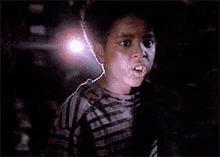 Jeremy Sylvers from "Child's Play 3" Ice Cube from "Anaconda" Nia Long from "Stigmata" LL Cool Jay from "Deep Blue Sea" Rah Digga from "Thir13en Ghosts" Halle Berry from "Gothika"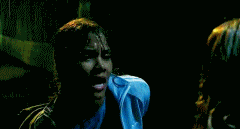 Samuel L. Jackson from "Snakes on a Plane"
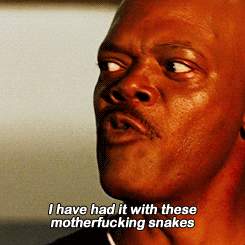 Naomie Harris from "28 Days Later..." Sennia Nanua from "The Girl With All The Gifts" DOESN'T DIE FIRST: DOESN'T DIE FIRST:Miguel A. Nunez Jr. from "The Return of the Living Dead III" Keith David from "They Live"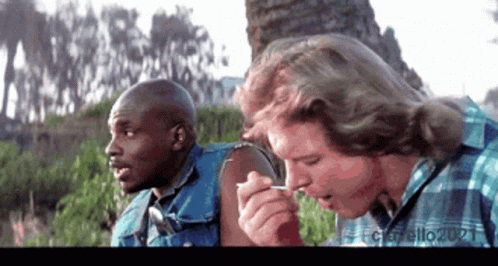 Russell Clark from "Fright Night Part II"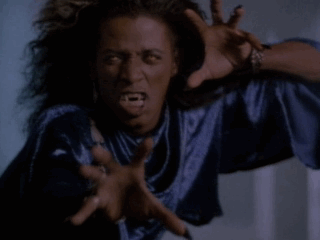 Dan Martin from "Sleepwalkers"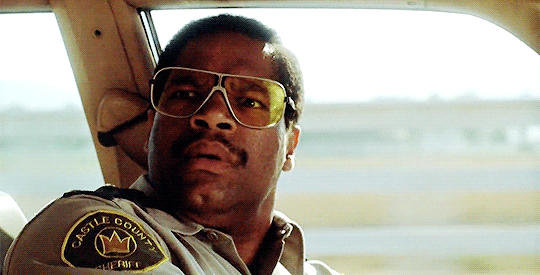 Kelly Rowland from "Freddy vs Jason" Ving Rhames from "Dawn of the Dead"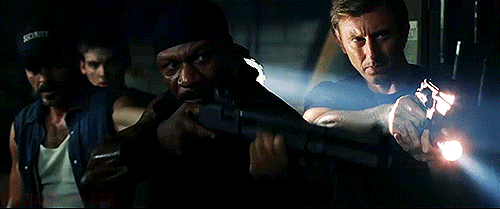 Steve Harris (camera man) from "Quarantine" Eric Ruffin from "The Transfiguration"
|
|
Deleted
Deleted Member
@Deleted
Posts: 0
Likes:
|
Post by Deleted on May 8, 2022 21:00:10 GMT
Just some examples of horror movies I can think of with black actors that do not die first or do not die at all. All of whom I don't think are mentioned yet, gifs included.  DOESN'T DIE: DOESN'T DIE:
Terry Alexander from "Day of the Dead" Brandon Quintin Adams from "The People Under the Stairs"
 Jeremy Sylvers from "Child's Play 3" Ice Cube from "Anaconda" Nia Long from "Stigmata" LL Cool Jay from "Deep Blue Sea" Rah Digga from "Thir13en Ghosts" Halle Berry from "Gothika" Samuel L. Jackson from "Snakes on a Plane"
 Naomie Harris from "28 Days Later..." Sennia Nanua from "The Girl With All The Gifts" DOESN'T DIE FIRST: DOESN'T DIE FIRST:Miguel A. Nunez Jr. from "The Return of the Living Dead III" Keith David from "They Live" Russell Clark from "Fright Night Part II" Dan Martin from "Sleepwalkers" Kelly Rowland from "Freddy vs Jason" Ving Rhames from "Dawn of the Dead" Steve Harris (camera man) from "Quarantine" Eric Ruffin from "The Transfiguration" For shits and giggles, here's some where they do: The Shining Gremlins Nightmare on Elm Street 4 Jurassic Park Mars Attacks! Scream 2 Mimic Then there's some where they're the first to die out of the main group or setting: Aliens Slaughter High Hollow Man Evil Dead |
|
|
|
Post by masterofallgoons on May 9, 2022 14:03:13 GMT
Sure, but I think it's pretty obvious that they knew what they were doing when they cast those actors and changed that dialogue, especially since the M.O. set forth by the previous movie was that all of these allusions to movies and tropes are self-referential. When they made changes like that, especially when it involved re-writing the script, I think it's kind of unreasonable to assume that it was all an accident and they had no idea what any of the implications were. And that last bit of dialogue, to me, seems clearly to reference what we've already seen. But you're right that they don't say specifically 'black people die first in horror movies.' But I think the combination of all of these elements, the somewhat commonly discussed trope of black characters dying in ensemble movies at large, the opening sequence, and that self-referential line of dialogue may very well be the source for people applying this idea largely to horror movie/slasher movies, more than a preponderance of examples. This, and I've also heard people cite The Shining a lot. But aren't you basically saying the movie introduced the trope? So if it didn't exist previously in context of horror, it's not unreasonable to assume the movie isn't deliberately lampshading it, especially when the added dialogue you mention is the exact opposite of complaining about black people dying too much. She says Stab is a "dumbass *white* movie, about dumbass *white* girls, getting their *white* asses cut the fuck up". Her boyfriend jokes that they should make the whole movie black and that's basically the end of it. I assume the whole scene was written in response to the first Scream having no minorities in it. I understand Duane Martin (Joel) improvised a lot of his scenes, so that very well could have been an adlib. I haven't found any evidence one way or another, though. But his character's main fear was always that he was the cameraman in a Scream movie, more so than being the black guy in a horror movie. It would be interesting if his one slightly vague line (note he also refers to it as "situations") cast some spell over the audience and made "the black guy always dies first in horror" a thing, but I don't really buy it, especially as I realize now Canadian Bacon actually did flat out say "the black guy always dies first". Here's the scene: I also just remembered seeing Saving Private Ryan for the first time and my family joking "the black dude died first" when Vin Diesel bit it.m, and they definitely weren't Scream fans. Ironically, following Scream 2, black characters were often among the survivors in horror. Deep Blue Sea, Halloween H20/Resurrection, I Still Know, Urban Legend, etc. No, that's not what I'm saying. I'm saying that it existed and was discussed as a basic movie trope across genres previously, but that it was more specifically attributed to horror and even more specifically slasher movies after Scream 2. That's not the same thing as saying no black character ever died in any movie ever before then. And again, seeing those 2 characters with pointed racial dialogue die in the opening sequence, and then the commentary from the camera guy later seems to make that point. Whether ad libbed or not, and even whether intentional or not, it's there, and I think it affects the perception of the commentary is. Whatever anybody said about Saving Private Ryan or in Canadian Bacon is not, in my mind, what makes people talk about this specifically when talking about slasher movies. And to the last point, I don't think that's ironic at all. With more and more people pointing out such a trope, I bet there was an effort to specifically avoid giving people fodder to make that critique.
|
|
Deleted
Deleted Member
@Deleted
Posts: 0
Likes:
|
Post by Deleted on May 11, 2022 0:20:12 GMT
But aren't you basically saying the movie introduced the trope? So if it didn't exist previously in context of horror, it's not unreasonable to assume the movie isn't deliberately lampshading it, especially when the added dialogue you mention is the exact opposite of complaining about black people dying too much. She says Stab is a "dumbass *white* movie, about dumbass *white* girls, getting their *white* asses cut the fuck up". Her boyfriend jokes that they should make the whole movie black and that's basically the end of it. I assume the whole scene was written in response to the first Scream having no minorities in it. I understand Duane Martin (Joel) improvised a lot of his scenes, so that very well could have been an adlib. I haven't found any evidence one way or another, though. But his character's main fear was always that he was the cameraman in a Scream movie, more so than being the black guy in a horror movie. It would be interesting if his one slightly vague line (note he also refers to it as "situations") cast some spell over the audience and made "the black guy always dies first in horror" a thing, but I don't really buy it, especially as I realize now Canadian Bacon actually did flat out say "the black guy always dies first". Here's the scene: I also just remembered seeing Saving Private Ryan for the first time and my family joking "the black dude died first" when Vin Diesel bit it.m, and they definitely weren't Scream fans. Ironically, following Scream 2, black characters were often among the survivors in horror. Deep Blue Sea, Halloween H20/Resurrection, I Still Know, Urban Legend, etc. No, that's not what I'm saying. I'm saying that it existed and was discussed as a basic movie trope across genres previously, but that it was more specifically attributed to horror and even more specifically slasher movies after Scream 2. That's not the same thing as saying no black character ever died in any movie ever before then. And again, seeing those 2 characters with pointed racial dialogue die in the opening sequence, and then the commentary from the camera guy later seems to make that point. Whether ad libbed or not, and even whether intentional or not, it's there, and I think it affects the perception of the commentary is. Whatever anybody said about Saving Private Ryan or in Canadian Bacon is not, in my mind, what makes people talk about this specifically when talking about slasher movies. And to the last point, I don't think that's ironic at all. With more and more people pointing out such a trope, I bet there was an effort to specifically avoid giving people fodder to make that critique. So I guess you and I are more or less on the same page and this dialogue has been somewhat pointless. I said it was already a general trope (thus the references to SPR and Canadian Bacon) that one way or another got attributed to horror movies specifically. Scream 2 being the second highest grossing slasher ever at the time certainly could have played a part in that. The one area we apparently disagree is how knowingly Scream 2 was doing it. You seem ride or die that the opening was a parody or lampshading of the trope, and I suppose in the Looking Glass universe, "dumbass white movie about dumbass white girls getting their white asses cut the fuck up" would translate to "black guy dies first". I said it was ironic, not that it didn't make sense. |
|